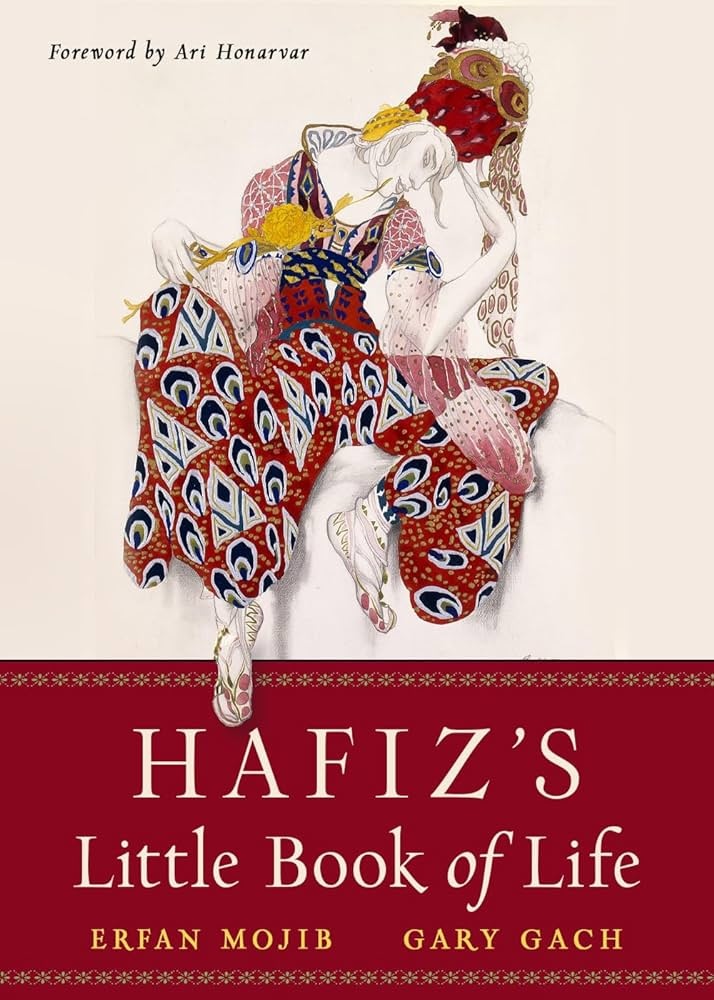
Hafiz’s Little Book of Life
Translated by Erfan Mojib and Gary Gach
Hampton Roads Publishing, 2023
978-1-64297-046-3
Will the real Hafiz (Shams al-Din Mohammad Hafiz-e Shirazi, 1325-1390 CE), aka Hafez, please stand up? If we don’t read Persian (Farsi), what are the options in terms of English translations and/or versions? These same questions can be asked of fellow Sufi Mystical Poets Rumi (1207-1273 CE) and Kabir (1398-1518 CE) whom I first encountered through the labors of the likes of Coleman Barks, Robert Bly, and Rabindranath Tagore among others. Perhaps you too first were exposed to Hafiz via the “versions” of Daniel Ladinsky, perhaps even being as terribly moved by a book like The Subject Tonight Is Love as I was, only to discover later that the poems therein were really Ladinsky’s own poems (though inspired by reading Hafiz!) which ended up making me feel confused (and duped!). Even Bly reminds us in his Kabir: Ecstatic Poems that maybe only a handful of the poems could definitively be said to have been written by Kabir, the rest of the poems attributed to the Sufi Master as they were passed down by his disciples before they were retrospectively collated together sometimes decades (or centuries!) After Kabir’s death.
Is it possible to be consequentially moved by translations and versions that are fake news?
Did some dude named Shakespeare actually write all of the plays collected in the First Folio?
Was the Odyssey really written by a blind Poet Seer named Homer, or is Homer merely a convenient moniker giving credit to a poem that was orally handed down collectively through the ages?
What we know is the Divan-e-Hafez collects all of Hafiz’s poems, including forms as varied as odes, quatrains, and ghazals, and that the thing was most likely complied after his death by his student Mohammad Golandam, (though some reports suggest it was edited during Hafiz’s lifetime more than two decades before his death) so in this case, authentic authorship is much less of a question. The best known English translators of the Divan include Peter Avery and Dick Davis, so why shell out dough for another crack at a book that people all over the world revere as scripture, even consulting its pages for divinatory answers?
In Ari Honarvar’s succinct foreword, we are told that this Little Book of Life is “the unexpected alchemy of two astute chefs, one steeped in Persian culture, and the other well-versed in radical mysticism, both master translators in their own right.” And in the informative Translators’ Notes at the end of the book, we are introduced to Abbas Kiarostami (1940-2016) who from 2006-2011 published in Persian “unique adaptations” of four major Persian poets, including Hafiz and Rumi, “by placing a frame around just a line or two of a single poem” before he “breaks it up into several lines, making the fragments a complete poem unto itself.” It is from Kiarostami’s radically modern and fragmented versions of Hafiz that we get our current glimpse into Hafiz’s own genius:
Stop begging
Like a servant
Of the Beloved
Expecting payment
Sometimes the haiku-like structures are centered on the page. Other times they are left-justified or indented far to the right:
In the circle of fate
We are the dot
Where the compass
Meets the paper
Perhaps you too thought of the figure John Donne makes in his “A Valediction: Forbidding Mourning,” written more than two centuries later:
If they be two, they are two so
As stiff twin compasses are two:
The soul, the fixed foot, makes no show
To move, but doth, if the other do.
Knowing that Hafiz was first translated into English in 1771 by William Jones, I am left wondering if Donne was even aware of Hafiz’s existence, or if he “got” our Sufi Master in some other magical way.
Reading through this collection feels like rifling through a jewelry box filled with gems, some familiar, some strikingly unknown. Here’s one of my favorites of the more than two-hundred fragments collected in this volume:
Make my eyelashes
The broom
Of your tavern
Here, the intoxication of mystical love finds an indelible image. These three lines (at the bottom of an otherwise blank page) appear late in a section of the book called “Garden of Love” which itself is nestled between “Garden of Wine” and “Garden of Wisdom.” This Little Book of Life is in turn bookended by the sections “Garden of the World” and “Garden of Ecstasy.” Taking a walk through these five books within a book in the order that they appear is one way to do it, to feel the cumulative accretions tugging against one another as they create new lyrical constellations both in the mind and on the page. Or you can just randomly flip through the pages at your own slow leisure and let your eyes alight on the exact thing that your heart needs most to hear!

